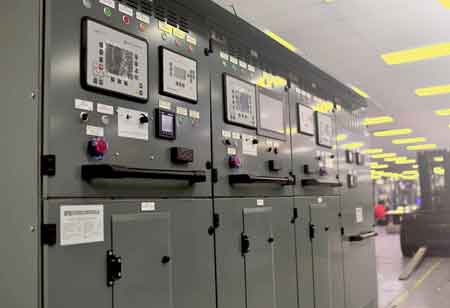

I agree We use cookies on this website to enhance your user experience. By clicking any link on this page you are giving your consent for us to set cookies. More info
Thank you for Subscribing to Electrical Business Review Weekly Brief

Europe is leading the global transition to renewable energy, leveraging innovative electrical switchgear technologies and stringent environmental regulations to promote eco-friendly practices.
Europe, leading the global transition to renewable energy, has experienced a surge in innovation across various sectors. The electrical switchgear industry, though often overlooked, plays a crucial role in this transformation. As the backbone of power distribution and control, switchgear technology is evolving rapidly to accommodate the influx of renewable energy sources, enhance energy efficiency, and minimise environmental impact. The Imperative for Innovation Integrating renewable energy sources, characterised by their intermittent nature, poses significant challenges to power grid stability. Traditional switchgear designs were not optimised for such dynamic conditions. To address this, manufacturers and researchers are developing cutting-edge solutions that can seamlessly accommodate the fluctuating output from solar and wind power. Moreover, escalating energy costs and growing environmental concerns necessitate a paradigm shift towards energy efficiency. Switchgear, as a critical component of power systems, offers immense potential for energy savings. Manufacturers are creating switchgear solutions that minimise energy losses and improve overall system efficiency by incorporating advanced materials, intelligent control systems, and optimised designs. Key Innovations Driving Change in Switchgear Technology Integrating digital technology with switchgear has led to the development of smart switchgear, which features real-time monitoring, self-diagnosis, and predictive maintenance. These intelligent devices, equipped with sensors and communication capabilities, optimise performance, enhance reliability, and reduce downtime. Modular design is also becoming increasingly popular. It offers flexible and scalable switchgear solutions that allow for easy customisation and expansion to meet evolving energy demands. This approach facilitates faster installation and reduces maintenance costs. Vacuum and gas-insulated switchgear (GIS) technologies provide superior performance, reliability, and safety compared to traditional oil-filled switchgear. Additionally, they have a smaller environmental footprint due to the absence of hazardous fluids. Condition-based monitoring is another significant innovation. It enables continuous monitoring of switchgear components to detect potential failures early, helping prevent unplanned outages and optimising maintenance schedules. The use of sustainable materials in switchgear manufacturing is also gaining prominence. There is a growing focus on using recycled and recyclable materials and developing environmentally friendly insulating materials and coolants to minimise environmental impact. European Leadership in Sustainable Switchgear Europe has established itself as a global leader in developing sustainable switchgear. Countries such as Germany, the Netherlands, and Sweden have made substantial investments in research and development, creating a vibrant innovation ecosystem. The European Union's stringent environmental regulations have further accelerated the adoption of eco-friendly switchgear solutions. The market for sustainable switchgear is poised for significant growth in the coming years. The demand for efficient and reliable power distribution systems will inevitably rise as the world transitions to a low-carbon future. By continuing to invest in research and development, fostering collaboration between industry and academia, and implementing supportive policies, Europe can solidify its position as a global leader in sustainable switchgear technology. Innovations in electrical switchgear design are crucial for successfully integrating renewable energy, improving energy efficiency, and reducing the environmental impact of power systems. Europe's commitment to sustainability has cultivated an innovative switchgear industry, setting a benchmark for the rest of the world.